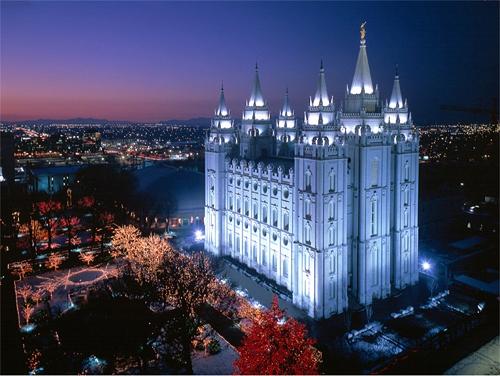Mormon Beliefs: Continuing Revelation
 Most Christian faiths espouse the belief that revelation ceased with the death of Christ’s apostles. That cessation of revelation would mean that scripture is closed, and that there is no current prophecy or prophets. The Mormon Church proclaims that God speaks to His children on earth wherever and whenever they will listen, that He has done so since the earth was created, and that He will continue to do so always:
Most Christian faiths espouse the belief that revelation ceased with the death of Christ’s apostles. That cessation of revelation would mean that scripture is closed, and that there is no current prophecy or prophets. The Mormon Church proclaims that God speaks to His children on earth wherever and whenever they will listen, that He has done so since the earth was created, and that He will continue to do so always:
“Know ye not that there are more nations than one? Know ye not that I, the Lord your God, have created all men, and that I remember those who are upon the isles of the sea; and that I rule in the heavens above and in the earth beneath; and I bring forth my word unto the children of men, yea, even upon all the nations of the earth?
“Wherefore murmur ye, because that ye shall receive more of my word? Know ye not that the testimony of two nations is a witness unto you that I am God, that I remember one nation like unto another? Wherefore, I speak the same words unto one nation like unto another. And when the two nations shall run together the testimony of the two nations shall run together also.
And I do this that I may prove unto many that I am the same yesterday, today, and forever; and that I speak forth my words according to mine own pleasure. And because that I have spoken one word ye need not suppose that I cannot speak another; for my work is not yet finished; neither shall it be until the end of man, neither from that time henceforth and forever” (2 Nephi 29:7-9).
Revelation does not only come through prophets, but to anyone who merits the companionship of the Holy Ghost.
This principle [of continuing revelation] is basic to our belief. President Wilford Woodruff declared, “Whenever the Lord had a people on the earth that he acknowledged as such, that people were led by revelation” (The Discourses of Wilford Woodruff, sel. G. Homer Durham [1946], 138). I affirm at the beginning that the inspiration of God is available to all who worthily seek the guidance of the Holy Spirit. This is particularly true of those who have received the gift of the Holy Ghost.
Article of Faith states… “We believe all that God has revealed, all that He does now reveal, and we believe that He will yet reveal many great and important things pertaining to the Kingdom of God.”
The first part of the ninth article of faith states, “We believe all that God has revealed.” Through the ages, God’s messages to His children generally have been revealed through prophets. Amos tells us, “Surely the Lord God will do nothing, but he revealeth his secret unto his servants the prophets” (Amos 3:7). These are the prophetic oracles who have tuned in over the centuries to the “celestial transmitting station,” with a responsibility to relay the Lord’s word to others.
The ninth article of faith continues: “We believe … all that [God] does now reveal.” For some strange reason it seems easier for many to believe the words of dead prophets rather than those of living prophets. The greatest revelator in our time has been Joseph Smith. In the difficult period between 1823 and 1843, just 20 years, 134 revelations were received, printed, and made public.
Each of the 92 Apostles called since then in The Church of Jesus Christ of Latter-day Saints has been sustained as a prophet, seer, and revelator. But the prophets, seers, and revelators succeeding Joseph as Presidents of the Church have been those Apostles in whom all of the keys of Christ’s earthly kingdom have been active and functioning. Many divine instructions have been received. Much revelation received, in this time as well as anciently, has been doctrinal. Some of it has been operational and tactical.
In our time God has revealed how to administer the Church with a membership of over [thirteen] million differently than when there were just six members of the Church. These differences include the use of modern technology, such as films, videos, computers, and satellite broadcasts, to teach and communicate new ways to conduct missionary work in various nations; the location and building of temples; and many others.
This process of revelation comes to the Church very frequently. President Wilford Woodruff stated, “This power is in the bosom of Almighty God, and he imparts it to his servants the prophets as they stand in need of it day by day to build up Zion” (The Discourses of Wilford Woodruff, 56). This is necessary for the Church to fulfill its mission. Without it, we would fail.
Elder Boyd K. Packer, Acting President of the Quorum of the Twelve Apostles, stated: “Revelation is a continuous principle in the Church. In one sense the Church is still being organized. As light and knowledge are given, as prophecies are fulfilled and more intelligence is received, another step forward can be taken” (The Holy Temple [1980], 137).
 This Church constantly needs the guidance of its head, the Lord and Savior, Jesus Christ. This was well taught by President George Q. Cannon, formerly a member of the First Presidency: “We have the Bible, the Book of Mormon and the Book of Doctrine and Covenants; but all these books, without the living oracles and a constant stream of revelation from the Lord, would not lead any people into the Celestial Kingdom of God. This may seem a strange declaration to make, but strange as it may sound, it is nevertheless true. [1]
This Church constantly needs the guidance of its head, the Lord and Savior, Jesus Christ. This was well taught by President George Q. Cannon, formerly a member of the First Presidency: “We have the Bible, the Book of Mormon and the Book of Doctrine and Covenants; but all these books, without the living oracles and a constant stream of revelation from the Lord, would not lead any people into the Celestial Kingdom of God. This may seem a strange declaration to make, but strange as it may sound, it is nevertheless true. [1]
In declaring new scripture and continuing revelation, Mormons pray they will never be arrogant or insensitive. But after a sacred vision in a now sacred grove answered in the affirmative the question “Does God exist?” what Joseph Smith and The Church of Jesus Christ of Latter-day Saints force us to face is the next interrogative, which necessarily follows: “Does He speak?” They bring the good news that He does and that He has. In a sense Joseph Smith and his prophetic successors in this Church answer the challenge Ralph Waldo Emerson put to the students of the Harvard Divinity School 170 years ago this coming summer. To that group of the Protestant best and brightest, the great sage of Concord pled that they teach “that God is, not was; that He speaketh, not spake” (An Address,” The Complete Writings of Ralph Waldo Emerson (1929), 45). [2]
